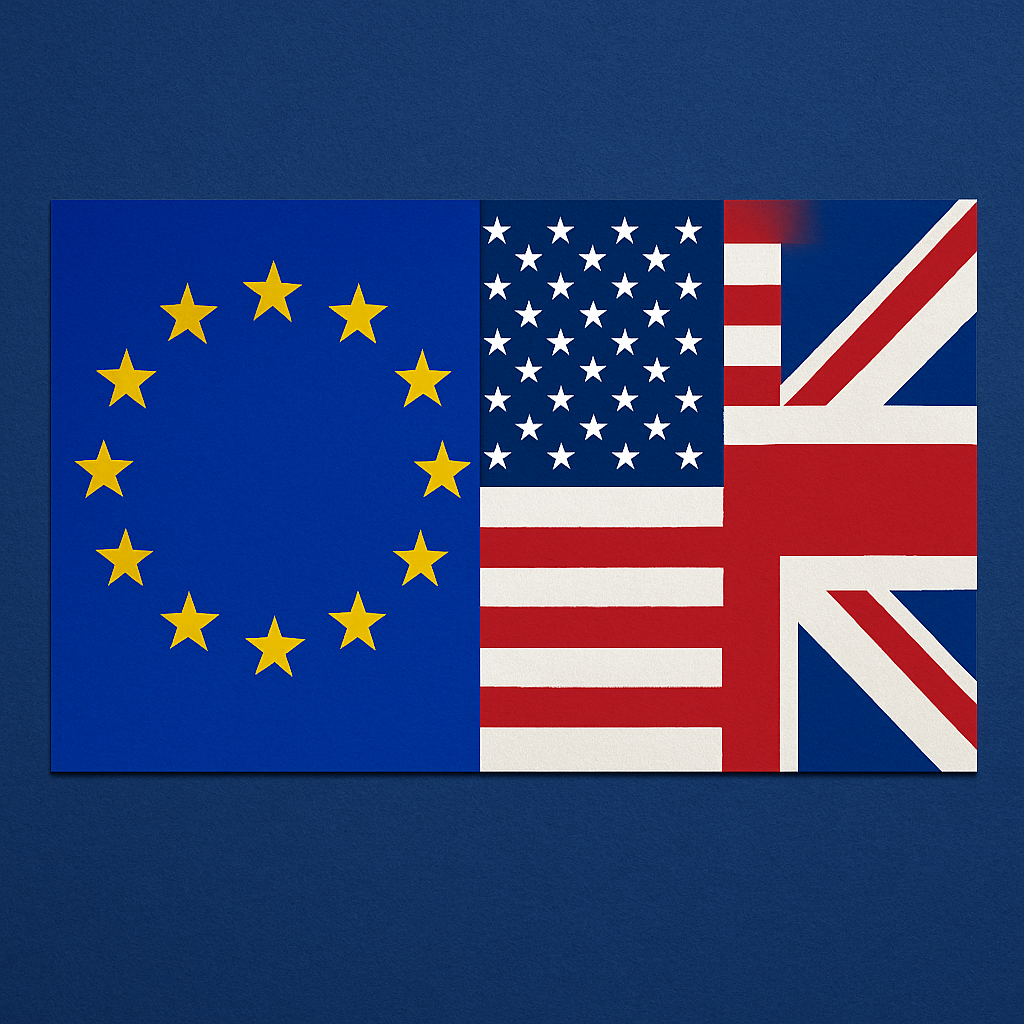⏰ Microsoft kiest voor het VK – Brussel blijft dromen terwijl de EU leegloopt

For our international clients: a full English version follows after the Dutch text
De aankondiging van Microsoft $MSFT om meer dan 30 miljard dollar te investeren in het Verenigd Koninkrijk tussen 2025 en 2028 is niet zomaar een zakelijk feit. Het is een keihard signaal dat de EU op de verkeerde weg zit.
Terwijl Londen miljarden en duizenden hoogwaardige banen naar zich toe trekt, blijft Brussel gevangen in grootse ideeën en papieren visies die in de praktijk bedrijven juist wegjagen. Als dit patroon zich voortzet, dreigt de EU niet alleen kapitaal te verliezen, maar ook haar eigen samenhang.
Een golf van Amerikaanse miljarden richting het VK
Microsoft zet 15 miljard dollar in om in het VK het grootste supercomputercluster van het land te bouwen, met meer dan 23.000 GPU’s in samenwerking met Nscale. De overige miljarden worden gebruikt voor banen en opleidingen.
En Microsoft staat niet alleen. Het VK trekt de laatste maanden miljardeninvesteringen aan van meerdere Amerikaanse techreuzen:
| Bedrijf | Investering | Focus | Details |
|---|---|---|---|
| Microsoft ($MSFT) | $30 mrd (2025-2028) | Cloud & AI | $15 mrd capex, supercomputer (23.000+ GPU’s), banen en training. |
| Google (Alphabet) | £5 mrd (~$6,8 mrd) | AI & data | Nieuw datacenter bij Londen, 8.000+ banen. |
| NVIDIA + OpenAI + Nscale | $40+ mrd (incl. “Stargate UK”) | AI-datacenters | Groot cluster in Blyth (Noordoost-Engeland). |
| Salesforce | Niet gespecificeerd | AI-operaties | Verdubbeling commitment in VK. |
| CoreWeave (met NVIDIA) | $2 mrd | AI-cloud | NVIDIA-chips in Schotland, Europees HQ in Londen. |
Deze investeringen zijn rechtstreeks gekoppeld aan het Amerikaans-Britse techpact, ondertekend door Donald Trump en Keir Starmer.
Het VK profileert zich als “AI Growth Zone”, terwijl Brussel vooral bezig is met regelgeving en commissies.
Brussel versus Londen: ideeën tegenover daden
Het contrast is pijnlijk duidelijk.
In Londen worden miljarden binnengehaald, nieuwe datacenters gebouwd en duizenden banen gecreëerd. In Brussel blijven rapporten en nieuwe regels de boventoon voeren.
De EU ziet zichzelf nog steeds als normsteller van de wereld, maar in werkelijkheid schiet ze zichzelf in de voet. De AI Act en de GDPR hebben een papieren utopie gecreëerd die innovatie smoort.
Startups worden verstikt door rapportages en compliance. Grote spelers ontwijken de EU of beperken hun activiteiten. Het resultaat: waar het VK miljarden aantrekt, verliest de EU bedrijven en talent.
Gevolgen: bedrijven vertrekken, de Unie brokkelt af
De harde realiteit is dat de Europese Unie steeds meer terrein verliest:
- Kapitaalvlucht – Amerikaanse miljarden vloeien naar Londen, niet naar Parijs of Berlijn.
- Brain drain – talentvolle Europeanen vertrekken omdat het klimaat voor innovatie elders beter is.
- Economisch verval – de productiviteit daalt en banen verdwijnen.
- Politieke scheuren – lidstaten die investeringen willen binnenhalen botsen met Brussel. Dit voedt nationale frustraties en versterkt de krachten die de EU uit elkaar trekken.
De droom van een “soevereine markt” blijkt in de praktijk een fata morgana.
Wat moet er veranderen in Brussel?
Als Brussel niet radicaal hervormt, is het tij niet meer te keren. De EU moet:
- Regels versimpelen – geen jungle van verordeningen, maar duidelijke en werkbare kaders.
- Eén interne markt creëren – geen versnippering in 27 nationale implementaties.
- Kapitaal en durf stimuleren – minder bescherming, meer ruimte voor risico en ondernemerschap.
- Strategische investeringen afdwingen – miljardenprogramma’s zoals in de VS en het VK, gericht op AI en infrastructuur.
Doet Brussel dit niet, dan dreigt niet alleen economisch verval, maar ook het uiteenvallen van de Unie zelf. En dat zou zonde zijn: de EU is in de basis een sterk initiatief, dat ooit is opgericht om stabiliteit, samenwerking en welvaart te garanderen. Maar zonder koerswijziging gaat juist die welvaart onherroepelijk verloren.
Conclusie
De Microsoft-investering in het VK legt de zwakte van de EU genadeloos bloot. Brussel droomt van leiderschap, maar blijft steken in papieren ambities en regelgeving die innovatie de das omdoet.
Ondertussen lopen bedrijven en kapitaal weg en dreigen interne spanningen de Unie zelf uit elkaar te trekken.
Het is geen kwestie van jaren, maar van nu: of Brussel verandert, of de EU schrijft zichzelf uit de toekomst. Wordt de EU slechts toeschouwer, dan zal de welvaart in de komende decennia onvermijdelijk achteruit hollen.
🔵 English version
Microsoft chooses the UK – Brussels keeps dreaming while the EU falls behind
Microsoft’s ($MSFT) decision to invest more than $30 billion in the United Kingdom between 2025 and 2028 is far more than a business milestone. It is a clear warning that the European Union is moving in the wrong direction.
While London attracts billions in fresh capital and creates thousands of high-skilled jobs, Brussels remains trapped in lofty visions and endless paperwork that in practice push companies away. If this trend continues, the EU risks losing not only investment but also its internal cohesion.
A wave of American billions flowing into the UK
Microsoft is allocating $15 billion to build the UK’s largest supercomputer cluster, equipped with more than 23,000 GPUs in partnership with Nscale. The remaining funds will support new jobs, operations, and AI training programs.
And Microsoft is not alone. In recent months, the UK has secured commitments worth billions from several major American tech companies:
| Company | Investment | Focus | Details |
|---|---|---|---|
| Microsoft ($MSFT) | $30 bn (2025–2028) | Cloud & AI | $15 bn capex, supercomputer (23,000+ GPUs), jobs and training. |
| Google (Alphabet) | £5 bn (~$6.8 bn) | AI & data | New data center near London, 8,000+ jobs. |
| NVIDIA + OpenAI + Nscale | $40+ bn (incl. “Stargate UK”) | AI data centers | Large-scale cluster in Blyth, Northeast England. |
| Salesforce | Not disclosed | AI operations | Doubling its UK commitment. |
| CoreWeave (with NVIDIA) | $2 bn | AI cloud | NVIDIA chips in Scotland, European HQ in London. |
These investments are closely linked to the new US–UK tech pact, signed by Donald Trump and Keir Starmer.
The UK is positioning itself as an “AI Growth Zone,” while Brussels remains preoccupied with drafting regulations and convening committees.
Brussels versus London: ideas versus execution
The contrast could not be sharper.
In London, billions are being deployed, data centers are being built, and jobs are being created. In Brussels, endless reports and regulatory debates dominate the agenda.
The EU still portrays itself as the global standard-setter, but in reality, it is undermining its own competitiveness. The AI Act and GDPR have created a paper utopia that suffocates innovation.
Startups drown in compliance and reporting obligations, while large players scale back or avoid the EU altogether. The result is clear: the UK attracts capital and talent, while the EU steadily loses both.
Consequences: capital leaves, the Union weakens
The facts on the ground are undeniable:
- Capital flight – American billions are flowing into London, not Paris or Berlin.
- Brain drain – Europe’s brightest talent moves abroad in search of a friendlier climate for innovation.
- Economic decline – productivity is falling, and jobs are being lost.
- Political fractures – member states eager for investment clash with Brussels, fueling frustration and strengthening centrifugal forces that threaten to pull the Union apart.
The dream of a “sovereign digital market” is proving to be little more than a mirage.
What Brussels must change
Unless Brussels undertakes radical reform, the damage will be irreversible. The EU must:
- Simplify regulation – abandon the regulatory jungle in favor of clear, workable frameworks.
- Build a genuine single market – eliminate fragmentation across 27 national regimes.
- Foster risk capital and entrepreneurship – shift from overprotection to enabling risk-taking.
- Mandate strategic investment – launch billion-euro programs comparable to the US and UK, targeting AI and critical infrastructure.
If Brussels fails to act, the outcome will not only be economic stagnation but potentially the fragmentation of the Union itself. That would be a profound loss: the EU remains, at its core, a strong initiative created to deliver stability, cooperation, and prosperity. Yet without a change of course, that prosperity will inevitably erode.
Conclusion
Microsoft’s investment in the UK exposes the EU’s weakness in the harshest possible terms. Brussels dreams of leadership but remains stuck in paper ambitions and overregulation that suffocates innovation.
Meanwhile, capital and companies leave, while internal tensions risk tearing the Union apart.
This is not a challenge for the distant future but for today. Either Brussels adapts, or the EU writes itself out of tomorrow’s world. Should the EU become merely a bystander, prosperity across the continent will inevitably decline in the decades ahead.
Disclaimer Aan de door ons opgestelde informatie kan op geen enkele wijze rechten worden ontleend. Alle door ons verstrekte informatie en analyses zijn geheel vrijblijvend. Alle consequenties van het op welke wijze dan ook toepassen van de informatie blijven volledig voor uw eigen rekening.
Wij aanvaarden geen aansprakelijkheid voor de mogelijke gevolgen of schade die zouden kunnen voortvloeien uit het gebruik van de door ons gepubliceerde informatie. U bent zelf eindverantwoordelijk voor de beslissingen die u neemt met betrekking tot uw beleggingen.





